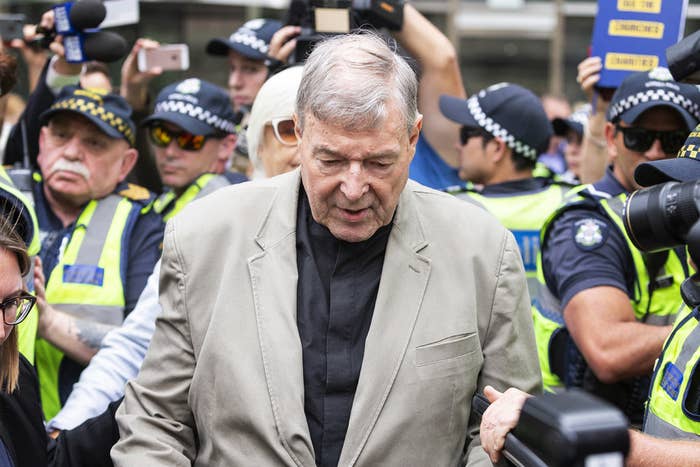
On Tuesday, the lifting of a suppression order in an Australian courtroom told the world that cardinal George Pell had been found guilty of child sexual abuse.
But of course, many around the world already knew.
Pell, the highest ranked Catholic to be convicted of child sex offences, was found guilty by a jury on Dec. 11, 2018.
He was convicted of one count of sexual penetration of a child aged under 16, and four counts of indecent acts with, or in the presence of, a child aged under 16 in 1996-1997, at St Patrick's Cathedral in Melbourne.
Shortly after the jury delivered its decision, international media outlets ran the story, and Pell's name started trending globally on social media.
But a suppression order prevented Australian media outlets from reporting on the verdict – until today.
Why was there a suppression order?
Pell was expected to face a second trial on a separate set of alleged offences.
The charges on which Pell has been found guilty was known as the cathedral trial, and the second, which pertained to allegations of indecent assault at a swimming pool in the 1970s, as the swimmers trial.
The suppression order, which prosecutors applied for, dictated that details of the first trial couldn't be reported until the conclusion of the second trial.
This was to protect the second trial by preventing the jury from seeing media coverage of the first and potentially being swayed or affected in their decision making.
The order was "necessary to prevent a real and substantial risk of prejudice to the proper administration of justice", ruled County Court judge Peter Kidd.
But the charges against Pell in the swimmers trial were dropped by the Victorian Department of Public Prosecutions (DPP) on Tuesday due to a lack of evidence.
With the second trial no longer going ahead, the suppression order was lifted.

What was suppressed?
Basically everything. The order prevented publication of any details about, or documents from, the first trial — including the fact that there were two trials, and the fact the suppression order was in place.
All that could be reported was this: cardinal Pell is facing prosecution for historical child sex offences in the County Court of Victoria.
The order applied within all of Australia, and on online media that was accessible within Australia.
Some international publications who reported on the verdict used geo-blocking to hide reports from Australian viewers, but in some cases they could still be seen on website homepages or by using a VPN. Other outlets did not geo-block.
What did Australian media outlets do?
Following the international media and social media reports, some Australian media outlets published news of the verdict without naming Pell, or specifying his crimes.
The Herald Sun published a black front page with the word "CENSORED" in bold.
In Melbourne newspaper The Age: "A very high-profile figure was convicted on Tuesday of a serious crime, but we are unable to report their identity due to a suppression order".
In Sydney newspaper the Daily Telegraph: "A high-profile Australian with a worldwide reputation has been convicted of an awful crime."
The media outlets had not opposed the initial suppression order but following the verdict, unsuccessfully applied for it to be revoked.
What happens now?
Numerous journalists are facing prosecution for contempt of court over those veiled publications in Australian media that did not name Pell.
According to the transcript of an emergency court hearing convened after the dramatic front pages were published, Judge Kidd said a number of people in the media were facing "the prospect of imprisonment and indeed substantial imprisonment".
"They seem to be operating on a misinformed basis that it's okay to print everything and anything apart from the name of your client," he told Pell's barrister Robert Richter.
BuzzFeed News understands potentially more than 100 journalists have since received letters from the DPP.
The letters indicate an intent to prosecute, and ask journalists to show cause as to why they should not be, a source who has viewed a letter told BuzzFeed News.
The source also said some people who were not connected to the actual publications in question have received the letters.
Media lawyer Peter Quill is representing a number of journalists and outlets that received letters, including News Corp, Fairfax Media and its new owner Nine, and Macquarie Media, which operates a number of radio stations.
Quill declined to comment.
Several Australian journalists reacted furiously to the editor-in-chief at American publication the Daily Beast, Noah Schactman, after he wrote on Twitter that the rest of the world "held their tongues" while the Daily Beast reported news of the verdict.
Journalists who decided to accept the government's gag order called us every name in the book for reporting the truth about the monstrous acts of one of the Vatican's most powerful men. I hope they are equally vociferous in their investigations of Pell.
The suppression order was put in place by Judge Kidd of the County Court, not by the Victorian or Australian government.
Melissa Davey, who was in court covering the trial for Guardian Australia, said she didn't break the order "because doing so would jeopardise justice for victims in the next trial".
Absolutely vile, uninformed comment from Noah [who was not in the case for a single day], and absolutely disrespectful to those who were. We didn't break the order because doing so would jeopardise justice for victims in the next trial. Not to mention, we'd absolutely be jailed. https://t.co/uWYhabXRhn
Phil Coorey, the political editor at the Australian Financial Review, kept his missive short.
@NoahShachtman you are a dickhead
Pell is expected to face a pre-sentence hearing on Wednesday.
